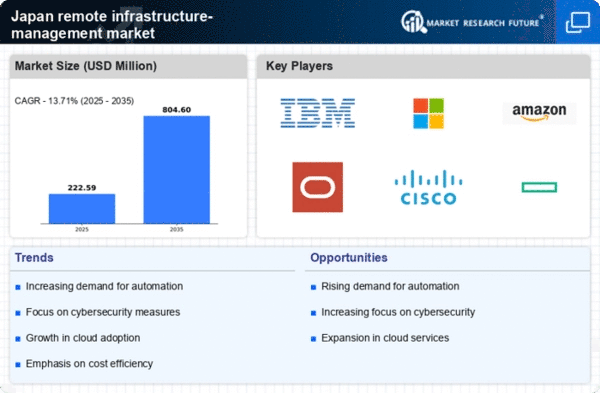Growing Demand for Cost Efficiency
the remote infrastructure-management market in Japan experienced a notable surge in demand for cost efficiency.. Organizations are increasingly seeking ways to optimize their operational expenditures, leading to a shift towards remote management solutions. This trend is driven by the need to reduce overhead costs associated with traditional infrastructure management. According to recent data, companies that adopt remote management solutions can potentially save up to 30% on operational costs. As businesses strive to enhance their financial performance, the remote infrastructure-management market becomes a critical component in achieving these objectives. The emphasis on cost efficiency is likely to continue shaping the market landscape, as organizations prioritize investments that yield substantial returns.
Shift Towards Sustainable Practices
In Japan, there is a notable shift towards sustainable practices within the remote infrastructure-management market. Organizations are increasingly prioritizing environmentally friendly solutions that reduce their carbon footprint. This shift is driven by both consumer demand and regulatory pressures to adopt sustainable practices. Data suggests that companies implementing remote management solutions can reduce energy consumption by up to 25%. As sustainability becomes a core business objective, the remote infrastructure-management market is likely to see a growing emphasis on solutions that align with these environmental goals. This trend reflects a broader commitment to corporate social responsibility and sustainable development.
Advancements in Network Technologies
The remote infrastructure-management market in Japan is significantly influenced by advancements in network technologies. The proliferation of high-speed internet and 5G connectivity is enabling organizations to implement more sophisticated remote management solutions. These technologies facilitate real-time monitoring and control of infrastructure, enhancing overall efficiency. Recent statistics suggest that the adoption of 5G could increase data transmission speeds by up to 100 times, thereby transforming the capabilities of remote management systems. As network technologies continue to evolve, they are likely to play a pivotal role in shaping the future of the remote infrastructure-management market.
Rising Focus on Operational Resilience
In Japan, the remote infrastructure-management market is witnessing a rising focus on operational resilience. Organizations are increasingly aware of the need to maintain uninterrupted services and minimize downtime. This awareness is prompting investments in remote management solutions that enhance system reliability and performance. Data indicates that companies with robust remote management strategies can reduce downtime by as much as 40%. As businesses navigate an increasingly complex operational environment, the demand for solutions that bolster resilience is expected to grow. This trend underscores the importance of remote infrastructure management in ensuring business continuity and operational effectiveness.
Increased Regulatory Compliance Requirements
the remote infrastructure-management market in Japan was also impacted by increased regulatory compliance requirements.. Organizations are facing stringent regulations regarding data security and privacy, necessitating the adoption of robust remote management solutions. Compliance with these regulations is essential to avoid potential penalties and reputational damage. Recent reports indicate that non-compliance can result in fines exceeding $1 million for organizations. As a result, businesses are increasingly investing in remote infrastructure management to ensure adherence to regulatory standards. This trend highlights the critical role of remote management solutions in facilitating compliance and mitigating risks.
















